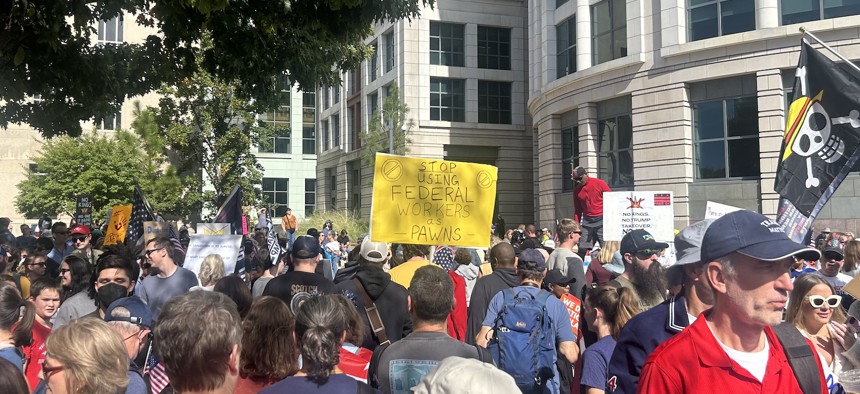
An individual at a 'No Kings' protest in Washington, D.C., on Saturday holds a sign that reads "Stop using federal workers as pawns." Sean Michael Newhouse / GovExec
Many federal employees bring 9 months of frustrations to ‘No Kings’ protest
Removals of government workers was one of a litany of issues brought up by attendees at the anti-Trump rally.
A crowd of thousands gathered in downtown Washington, D.C., Saturday as part of the nationwide anti-Trump 'No Kings' rallies with a long list of White House actions they were protesting against: mass deportations of undocumented immigrants; National Guard deployments in Democratic-controlled cities ostensibly to combat crime; the looming expiration of Affordable Care Act health insurance subsidies, which is the main cause of the ongoing government shutdown.
But Saturday’s event also was an opportunity for dozens of participating federal employees, many of whom have lost their jobs and seen their years of experience be discarded, to come together.
“Connecting in person with people matters, and so building those bonds with fellow activists is really important,” said Mike Henning, president of American Federation of Government Employees Local 1534, which represents employees at the State Department and U.S. Agency for International Development. “It takes a small number to make change, and protests are a way to see who is the most active, who is the most present and try to accentuate that.”
Henning worked as a democracy officer for more than three decades at USAID — which the Trump administration has effectively eliminated as part of its push to shrink the size of the federal government — before participating in the deferred resignation program through which more than 150,000 civil servants left government service.
“We would help provide lawyers for people in tough places like Russia or Azerbaijan and Belarus [as well as] support for their families. These are people that risk their lives to speak out. Some of them have died,” Henning said. “USAID and the U.S. government are not there anymore, [not only] in a rhetorical sense speaking on behalf of those folks, but also in a very real sense of tangible support.”
Sen. Bernie Sanders, I-Vt., who was the last speaker at Saturday’s protest, warned that self-government in America was in jeopardy.
“It is in danger when we have a president who illegally fires tens of thousands of federal employees right here in Washington, D.C., and throughout our country and rips up union contracts that workers have fought for and won,” he said, eliciting a cheer that prompted him to briefly pause his remarks.
Trump in March signed an executive order to remove collective bargaining rights for two-thirds of federal employees on national security grounds.
Paul Osadebe, a civil rights attorney at the Housing and Urban Development’s Office of Fair Housing who also attended Saturday’s protest, likewise was critical of the direction his agency is going under the second Trump administration.
“We take every case no matter what. It doesn't matter your race, gender, your citizenship status. None of that matters,” said Osadebe, who also is a union steward for AFGE Local 476. “When you come to us with a complaint, we're supposed to help, and that's the type of place that I wanted to work. Unfortunately, that has been really hampered since January.”
Osadebe was one of the whistleblowers who filed a report in September alleging that Secretary Scott Turner has largely dismantled HUD’s civil rights enforcement capabilities. Since then, the lawyer has been placed on administrative leave.
“We filed official complaints [and] unofficial complaints just to the public. We made sure that it couldn't be ignored or hidden, and that we were partnering with all the civil rights groups and the people that we serve,” he said. “So that's not the typical way people do whistleblowing, but that is the union way. That is the way to be heard in this environment. So that's what we did. And [HUD] did not like that very much.”
In a statement to The New York Times, which first reported on the whistleblower filing, a HUD spokeswoman said that it was “patently false” to suggest the department was weakening enforcement of laws that prohibit discrimination in housing.
Anthony Lee, an employee at the Food and Drug Administration and president for National Treasury Employees Union Chapter 282, carried a sign that read “RIF RFK Jr,” referencing the reductions in force directed by Health and Human Services Secretary Robert F. Kennedy Jr. HHS has laid off more than 10,000 employees since the start of the year, including nearly 1,000 who have been RIF’d since the beginning of the government shutdown.
“We say RIF really means, instead of reduction in force, reverse illegal firings,” Lee said.
He said he was heartened by the crowd size on Saturday.
“I think it's important that we win in the court of public opinion, and the more people we can get out to events like this, the better that the public can understand what's at stake,” Lee said. “The desired impact is to get the public engaged in their democracy to push back on what's been happening, which is the dismantling of our government institutions and our public services.”
Share your news tips with us: Sean Michael Newhouse: snewhouse@govexec.com, Signal: seanthenewsboy.45







